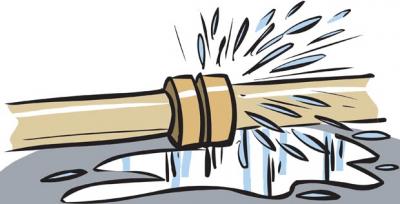The new proposal to peg the water prices to inflation rates seems quite plausible – indeed, if the State intends to consider each and every department falling under its control to become financially autonomous, then this form of automatic pricing mechanism appears logical. But then, why impose these hikes onto all consumers, domestic and non-domestic indiscriminately? Even if domestic consumers (with very predictable consumption patterns, hence easily controllable as having the lowest impact in terms of demand planning) constitute the majority of the revenue base of CWA, it is in fact the non-domestic stream that imposes the largest technical constraints on its ageing network.
Consider this: why do you think that an industrial connection cost more than a domestic tapping? Would your (for example) budding laundry business or car-washing start-up be capable of sustaining itself with a common 6 bar, 50 litres per minute that an ordinary half-inch diameter connection can muster? Of course not. Now imagine the pressure and volume that our renowned (and lesser ones) factories require at odd hours. And the hotels. And the others in the manufacturing sector? So, it would be more plausible to encourage these heavy unpredictable users to invest in stabilizing the demand they impose on the public mains – say by a combination of reducing their demand from the network, building buffer storage capacity, and introducing water-saving measures, which would reduce pressure onto the Water Resources Unit to find new, alternative sources of potable water (are there any other viable sources?) and the need for further investment in absurd ideas (like desalination in our context) . But since the current incentives to save water do not seem to be working, it could be worthwhile considering a particularly constraining levy onto all high-volume water consumers that do not implement water-saving measures (say, dual piping systems to direct grey water for irrigating your golf courses and lawns). For the time being, however, most of these thirsty industries just apply for a permit for drilling into our aquifers (State-owned by law) and just pump without even thinking about efficient water management (CWA’s highly regarded bi-decennial hydrological yearbook might enlighten us on this, but are these data even metered, and will the publication resume to clear the backlog accumulated since 2000?). The Singaporean study on CWA’s unaccounted-for water could have hopefully enlightened us all on the real magnitude of losses, but here also, the large-volume meters are yet to be installed. ?Hopefully though, the current pipelines replacement and renewal programmes are slowly but surely catching up and we should see a gradual improvement in the stability of pressure until all weak points are tracked down and reduced. Not eliminated: the « 24/7 » continuous supply cannot be guaranteed in this way. For this, we would be needing an active leak detection unit empowered with the means to intervene on the mains at all ?times.
As for making CWA profitable, there is also no better proof of short-termism than this – Mauritius is a Welfare State, and such a vital resource should be made available to the masses in the safest and least cost possible. Else, a significant part of the poorest of Mauritians will find even the minimum water charges so unaffordable that they will have recourse to unsafe, untapped water. This will result in a surge in water-borne, potentially fatal, diseases – would it not conflict with our proclaimed intention of becoming a high-revenue country, a knowledge/education hub, glittering ‘Smart Cities’ and what not? Can Mauritius afford such a public health nightmare??In fact, should it be a burden for some to save on electricity by preventing their children from studying at night or save on CWA bills by taking the risk of ingesting life-threatening Escherichia coli from untapped sources? If the State is to aim at sustainability, public utilities should be most affordable for the people, which so far remains the most effective means of redistribution of wealth: a combination of progressive fiscal regime, humane pricing of public utilities and a prudential management of our currency (remember how our imports skyrocketed in rupees since February 2015?) this is how we would ensure that the main resource of Mauritius – we, the People – is kept in good health, safe and confident in its future as a socially peaceful country.
Better than increasing the price of water? Decrease it!
- Publicité -
EN CONTINU ↻


